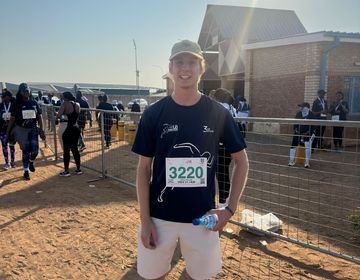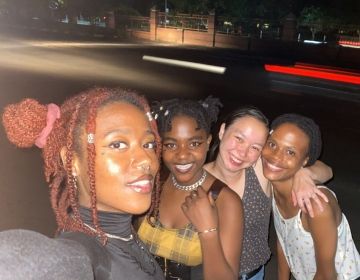Advice from an Arts and Sciences Student in Botswana
Hey all! My name is Elise, and I have been in Gaborone for almost three months now. I decided to do a bit of reflecting in the form of advice, so hopefully this is helpful to someone!
Housing:
One of the first decisions you will have to make if you choose this program is if you want to live on campus or with a homestay. While this is a big choice to make that will have implications on your experience abroad, you should know that both are good options. As a warning, I am a homestay student, and I absolutely love my family, so I may be a bit biased, and I can only really comment on my own experiences. So here goes. Don’t be scared to do a homestay. Living in the dorms is a more predictable. You know what your room will be like. You know you will have a roommate. You know you will live on campus. You know what your food options are. You know you have limited cooking options. In a homestay, you know some things but not nearly as much. You know that you get your own room. You know your family should provide you two meals per day. That’s about all you know when you choose the option. You don’t know how far away from school you will be. You don’t know how many people are in your family. You don’t know what your family is like. You don’t know how often relatives will stay at your house. What I can tell you is that living in a homestay is worth the uncertainty. The CIEE staff does an amazing job of connecting students with families. If you are on the edge, I highly recommend choosing the homestay option because it will immerse you in the culture more, you have your own space, you have ready-made friends, and you get off campus often. And if you get lucky, you may get cute kittens!
Transportation:
One of my only worries about staying with a homestay family was the commute. Low and behold, I ended up living with a family that lived the furthest from school. When I learned that my commute would take me about an hour every day I was so worried because I was used to having a five-minute walk from my room to my classes back home. While my commute is my least favorite part of my homestay experience, it isn’t nearly as bad as I thought it would be. The public transportation system (combis and taxis) are confusing at first, but once you know how to get from home to school and back, they are easy and reliable. Since we are not supposed to take combis after dark, sometimes I have to pay for a special taxi, or a cab, to get home. The point is, getting home and around otherwise is not difficult and you will adjust to your particular housing situation.
Academics:
Arts and Sciences students: you are not required to take the Setswana course; however, you should definitely take it. It did not fit into my schedule, so I decided not to take it. This was the biggest mistake I made all semester. I wish I was learning the language so I could interact with more people and feel less like an outsider. Whatever you do, or whatever your schedule looks like, make sure you take the Setswana course!
Traveling:
Even if you are only here for a semester, make time to travel. There are so many beautiful places in Botswana and surrounding countries, and you will have time. If you are on a tight budget, you can save costs by traveling with others, sharing Airbnbs, camping, and bringing/cooking your own food.
Lesotho:
I went slackpacking here over spring break. If you like hiking, I highly recommend making time to go here. Guided hiking is recommended because the trails are hard to follow and sometimes nonexistent. My friends and I went on a guided tour through Sani Lodge in South Africa.
Maputo, Mozambique: The city is interesting to look around, but most people go to Mozambique for the beaches. If you have time, go to Tofo Beach. If you don’t want to spend the time or money to get there, but you still want to go to a beach, go to Macaneta, which is close to Maputo.
Swakopmund, Namibia:
Being by the gorgeous dunes and the Atlantic Ocean was incredible. I highly recommend this destination. Popular activities here are sandboarding, quad biking, horseback riding, kayaking with seals, and others.
Cape Town:
This city provides a fantastic experience to hike, eat delicious food, and it reminds you what a western city is like. Hello Uber!
Overall:
My experience abroad was incredible, and the program was perfect for me. That being said, make sure this is the right program for you. Here are some dos and don’ts to consider:
Do: come on this program if you are flexible and can adapt to a new environment.
Do: come on this program if you are genuinely interested in learning about a new culture and want to immerse yourself in it.
Do: come on this program if you are interested in having conversations about race and culture.
Don’t: come on this program if you will be a minority here and you cannot handle being visible.
Don’t: come of this program if you will just compare the society here to yours in the United States and won’t take the time to appreciate it for what it is.
I hope that some of my reflections will help you choose a study abroad program and prepare you for traveling to Botswana if you choose this amazing program!
Related Posts
Arthur Pounds Join UB Marathon: Persevering through the finish line
Authored by: Ruby Pitinyane On October 13, 2024, Arthur Pounds (AJ) took part in the University of Botswana (UB) marathon at the UB Stadium, marking a significant milestone for him... keep reading
My Sense of Belonging in Botswana
By: Brianna James Even though my study abroad program concluded in May 2023, I am still brought to tears of reminiscence when I reflect on all those wonderful moments I... keep reading
Internship at Moselewapula
For my fall internship with CIEE in Botswana, I had the opportunity to intern for the Guidance Department at Moselewapula Junior Secondary School in Phase 2 of Gaborone. I was... keep reading







